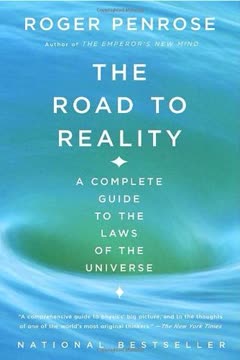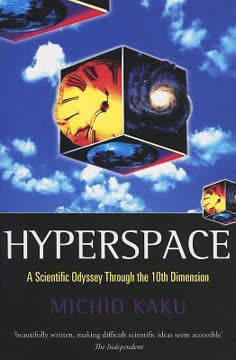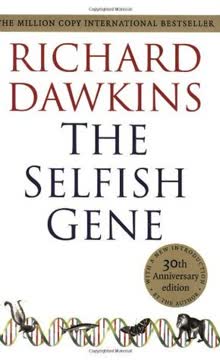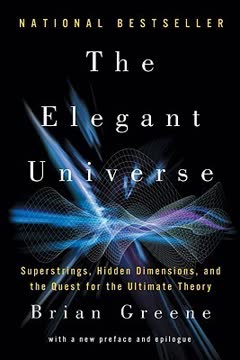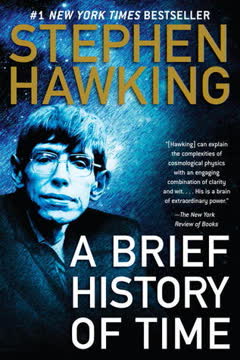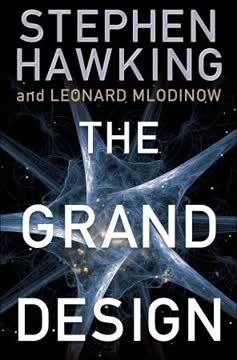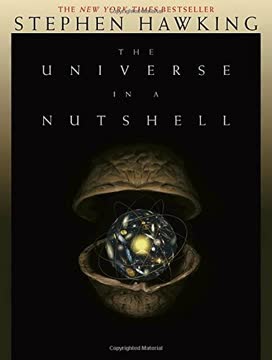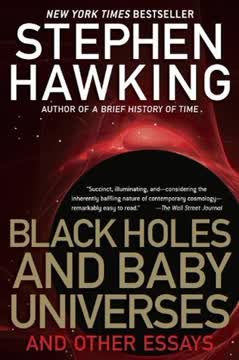Belangrijkste punten
1. Tijd en Ruimte Zijn Niet Absoluut
"Tijd werd behandeld alsof het een rechte spoorlijn was waarop je slechts één kant op kon gaan."
Revolutionair Perspectief. De relativiteitstheorie van Einstein heeft onze opvatting over tijd en ruimte fundamenteel veranderd van absolute, vaste concepten naar relatieve, dynamische dimensies die door verschillende waarnemers anders kunnen worden ervaren.
Belangrijke Implicaties:
- Tijd is niet universeel, maar persoonlijk voor elke waarnemer
- Waarnemers die zich met verschillende snelheden bewegen, zullen tijd anders meten
- De snelheid van het licht blijft constant voor alle waarnemers
Experimenteel Bewijs. Waarnemingen zoals het Michelson-Morley-experiment toonden aan dat de snelheid van licht consistent is, ongeacht de beweging van de waarnemer, wat de klassieke opvattingen over absolute tijd en ruimte uitdaagt.
2. Het Universum Heeft een Begin en een Expansieve Natuur
"Als het universum was gecreëerd zonder het uitsluitingsprincipe, zouden quarks geen aparte, goed gedefinieerde protonen en neutronen vormen."
Big Bang Theorie. Het universum is ontstaan uit een ongelooflijk dichte, hete toestand ongeveer 13,8 miljard jaar geleden, en breidde zich snel uit en evolueerde door complexe fysieke processen die uiteindelijk sterrenstelsels, sterren en complexe structuren creëerden.
Kosmische Evolutie:
- De initiële toestand was extreem heet en uniform
- Geleidelijk afkoelen maakte de vorming van atomaire structuren mogelijk
- De expansie gaat door, mogelijk voor altijd
- Sterrenstelsels vormden zich door gravitatie aantrekkingskracht
Observational Confirmation. Edwin Hubble's ontdekking dat verre sterrenstelsels van ons weg bewegen, leverde empirisch bewijs voor het model van een uitbreidend universum.
3. Kwantummechanica Introduceert Onzekerheid en Kans
"Kwantummechanica voorspelt geen enkele definitieve uitkomst voor een observatie. In plaats daarvan voorspelt het een aantal verschillende mogelijke uitkomsten en vertelt het ons hoe waarschijnlijk elke uitkomst is."
Probabilistisch Universum. In tegenstelling tot de klassieke natuurkunde suggereert de kwantummechanica dat fundamentele deeltjes bestaan in probabilistische toestanden, met meerdere potentiële uitkomsten voor elke gegeven observatie.
Belangrijke Kwantumprincipes:
- Deeltjes kunnen gelijktijdig in meerdere toestanden bestaan
- Observatie beïnvloedt de toestand van de deeltjes
- Nauwkeurige meting van positie en snelheid is onmogelijk
- Willekeurigheid is inherent aan de natuur
Revolutionaire Implicaties. Deze benadering daagt deterministische opvattingen over het universum uit, en suggereert dat fundamentele onzekerheid een kernkenmerk van de realiteit is.
4. Zwaartekracht Vormt de Structuur van het Universum
"Zwaartekracht is veruit de zwakste van de vier krachten; het is zo zwak dat we het helemaal niet zouden opmerken als het niet voor twee speciale eigenschappen was: het kan over grote afstanden werken en het is altijd aantrekkend."
Gravitational Influence. Ondanks dat het de zwakste fundamentele kracht is, speelt zwaartekracht een cruciale rol in het vormen van kosmische structuren door zijn langeafstandseffecten.
Gravitational Characteristics:
- Werkt universeel op alle materie
- Trekt in plaats van af te stoten
- Bepaalt grootschalige kosmische structuren
- Fundamenteel voor het begrijpen van zwarte gaten en kosmische evolutie
Bijdrage van Einstein. De algemene relativiteitstheorie onthulde zwaartekracht als een kromming van de ruimte-tijd, wat onze opvatting transformeerde van een kracht naar een geometrische eigenschap van het universum.
5. Zwarte Gaten Zijn Niet Echt Zwart
"Zwarte gaten zijn een van de weinige gevallen in de geschiedenis van de wetenschap waarin een theorie in grote detail als een wiskundig model werd ontwikkeld voordat er enige bewijs uit observaties was."
Kwantum Zwarte Gat Eigenschappen:
- Stoten straling uit (Hawking-straling)
- Hebben een eindige temperatuur
- Kunnen geleidelijk verdampen
- Vertegenwoordigen extreme zwaartekrachtomgevingen
Theoretische Doorbraak. Het werk van Hawking toonde aan dat kwantummechanica zwarte gaten in staat stelt om deeltjes uit te stoten, wat de eerdere opvattingen over deze kosmische fenomenen uitdaagt.
Observational Relevance. Zwarte gaten bieden unieke laboratoria voor het testen van fundamentele fysieke theorieën over zwaartekracht, kwantummechanica en ruimte-tijd.
6. Fundamentele Krachten Kunnen Worden Geünificeerd
"Uiteindelijk hoopt men echter een complete, consistente, verenigde theorie te vinden die al deze partiële theorieën als benaderingen zou omvatten."
Zoektocht naar Unificatie. Wetenschappers streven naar een uitgebreide theorie die zwaartekracht, elektromagnetische, sterke en zwakke nucleaire krachten integreert in een enkel, coherent kader.
Theoretische Benaderingen:
- Stringtheorie
- Kwantumzwaartekrachtmodellen
- Grote Geünificeerde Theorieën (GUT's)
- Verkenning van extra dimensies
Uitdagingen. Huidige theorieën hebben moeite om kwantummechanica volledig te verzoenen met zwaartekrachtseffecten op microscopische schalen.
7. De Pijl van de Tijd en Entropie
"Wanorde neemt toe met de tijd omdat we de tijd meten in de richting waarin de wanorde toeneemt."
Thermodynamische Tijdrichting. Het universum neigt naar toenemende wanorde, wat een fundamentele "pijl van de tijd" creëert die het verleden van de toekomst onderscheidt.
Belangrijke Tijdspijlen:
- Thermodynamische pijl (toename van entropie)
- Psychologische pijl (geheugenprogressie)
- Kosmologische pijl (expansie van het universum)
Filosofische Implicaties. Onze perceptie en ervaring van tijd zijn intrinsiek verbonden met de neiging van het universum naar grotere complexiteit en willekeurigheid.
8. Het Universum Zou Zelfvoorzienend Kunnen Zijn
"Het universum zou volledig zelfvoorzienend zijn en niet beïnvloed worden door iets buiten zichzelf. Het zou noch gecreëerd, noch vernietigd worden. Het zou gewoon ZIJN."
No-Boundary Voorstel. Het universum zou kunnen bestaan zonder externe oorzaak, voortkomend uit kwantumfluctuaties met inherente wiskundige consistentie.
Theoretische Overwegingen:
- Ruimte-tijd zou eindig maar grenzeloos kunnen zijn
- Geen behoefte aan een externe schepper
- Geregeerd door intrinsieke wiskundige wetten
Radicaal Perspectief. Daagt traditionele theologische en filosofische opvattingen over kosmische oorsprongen uit.
9. Wetenschappelijke Theoriën Zijn Wiskundige Modellen van Observatie
"Een wetenschappelijke theorie is gewoon een wiskundig model dat we maken om onze observaties te beschrijven: het bestaat alleen in onze geest."
Wetenschappelijke Methodologie. Theoriën vertegenwoordigen menselijke pogingen om observeerbare fenomenen wiskundig te beschrijven en te voorspellen, waarbij hun voorlopige en evoluerende aard wordt erkend.
Kenmerken van Theoriën:
- Voorspellende capaciteiten
- Empirische toetsbaarheid
- Onderhevig aan herziening
- Benaderingen van de realiteit
Epistemische Nederigheid. Erkent wetenschappelijke kennis als een doorlopend proces van begrip in plaats van absolute waarheid.
10. Menselijk Bestaan Is een Opmerkelijk Kosmisch Toeval
"Het opmerkelijke feit is dat de waarden van deze getallen lijken te zijn afgestemd om de ontwikkeling van leven mogelijk te maken."
Anthropisch Principe. Ons bestaan hangt af van een buitengewoon precieze configuratie van universele constanten en fysieke wetten.
Kosmische Onwaarschijnlijkheid:
- Minuscule variaties in fundamentele constanten zouden leven verhinderen
- Complexe structuren ontstaan uit aanvankelijk eenvoudige omstandigheden
- Menselijk bewustzijn vertegenwoordigt een onwaarschijnlijk kosmisch resultaat
Filosofische Reflectie. Benadrukt zowel de willekeurigheid als de mogelijke doelgerichtheid van het ontwerp van ons universum.
Laatst bijgewerkt:
FAQ
What's "A Brief History of Time" about?
- Exploration of the Universe: "A Brief History of Time" by Stephen Hawking explores the nature of the universe, discussing its origins, structure, and eventual fate.
- Complex Concepts Simplified: The book aims to explain complex scientific concepts like black holes, the big bang, and quantum mechanics in a way that is accessible to non-scientists.
- Unified Theory: Hawking discusses the quest for a unified theory that combines general relativity and quantum mechanics to explain all physical aspects of the universe.
- Philosophical Implications: It also delves into the philosophical implications of scientific discoveries, questioning the role of God and the nature of time.
Why should I read "A Brief History of Time"?
- Understanding the Universe: It provides a comprehensive overview of the universe's workings, making it essential for anyone interested in cosmology and physics.
- Accessible Science: Hawking's ability to simplify complex ideas makes it a great read for those without a scientific background.
- Intellectual Curiosity: The book challenges readers to think about profound questions regarding existence, time, and the universe.
- Cultural Impact: As a bestseller, it has influenced both scientific and popular culture, making it a significant work in modern literature.
What are the key takeaways of "A Brief History of Time"?
- Nature of Time: Time is not absolute and is intertwined with space, forming a four-dimensional space-time continuum.
- Black Holes: Black holes are regions where gravity is so strong that nothing, not even light, can escape, and they can emit radiation.
- Big Bang Theory: The universe began with a big bang, a singularity where all known laws of physics break down.
- Unified Theory: The search for a unified theory that combines general relativity and quantum mechanics is ongoing and crucial for understanding the universe.
What are the best quotes from "A Brief History of Time" and what do they mean?
- "If time travel is possible, where are the tourists from the future?" This quote highlights the paradoxes and challenges associated with the concept of time travel.
- "The universe doesn't allow perfection." It suggests that imperfections and uncertainties are inherent in the universe, aligning with the principles of quantum mechanics.
- "The boundary condition of the universe is that it has no boundary." This reflects Hawking's no-boundary proposal, suggesting the universe is finite but without edges or singularities.
- "We are just an advanced breed of monkeys on a minor planet of a very average star." This quote emphasizes the insignificance of human existence in the vast universe.
How does Stephen Hawking explain black holes in "A Brief History of Time"?
- Definition and Nature: Black holes are regions in space where gravity is so strong that nothing can escape from them, not even light.
- Event Horizon: The boundary around a black hole is called the event horizon, beyond which nothing can return.
- Hawking Radiation: Hawking theorizes that black holes can emit radiation due to quantum effects near the event horizon, leading to their eventual evaporation.
- Singularity: At the center of a black hole lies a singularity, a point of infinite density where the laws of physics as we know them cease to function.
What is the significance of the big bang theory in "A Brief History of Time"?
- Origin of the Universe: The big bang theory posits that the universe began from an extremely hot and dense singularity and has been expanding ever since.
- Cosmic Microwave Background: The theory is supported by the discovery of cosmic microwave background radiation, the afterglow of the big bang.
- Time and Space: It suggests that time and space themselves began with the big bang, challenging the notion of a universe existing eternally.
- Scientific and Philosophical Impact: The big bang theory has profound implications for understanding the universe's origin and the nature of time.
How does "A Brief History of Time" address the concept of time?
- Relative Time: Time is not absolute but relative, varying for different observers depending on their velocity and gravitational field.
- Imaginary Time: Hawking introduces the concept of imaginary time, which is indistinguishable from directions in space and helps in understanding the universe's boundaries.
- Arrow of Time: The book discusses the thermodynamic, psychological, and cosmological arrows of time, explaining why time seems to move in one direction.
- Time's Beginning and End: It explores the idea that time began with the big bang and may end with the big crunch or in black holes.
What is the role of quantum mechanics in "A Brief History of Time"?
- Uncertainty Principle: Quantum mechanics introduces uncertainty, meaning we cannot predict exact outcomes, only probabilities.
- Wave-Particle Duality: Particles can exhibit properties of both waves and particles, challenging classical physics' distinct categories.
- Quantum Gravity: The book discusses the need to unify quantum mechanics with general relativity to form a complete theory of quantum gravity.
- Impact on Cosmology: Quantum mechanics plays a crucial role in understanding the early universe and phenomena like black hole radiation.
How does Stephen Hawking approach the search for a unified theory in "A Brief History of Time"?
- Grand Unified Theories (GUTs): Hawking discusses attempts to unify the electromagnetic, weak, and strong nuclear forces into a single framework.
- Challenges with Gravity: The main challenge is incorporating gravity, described by general relativity, with quantum mechanics.
- String Theory: The book explores string theory as a potential candidate for a unified theory, where particles are one-dimensional strings.
- Ultimate Goal: The search for a unified theory aims to provide a complete understanding of the universe's fundamental forces and particles.
What is the anthropic principle as discussed in "A Brief History of Time"?
- Weak Anthropic Principle: It suggests that the universe's laws appear fine-tuned for life because only in such a universe could observers like us exist.
- Strong Anthropic Principle: This version posits that the universe must have properties that allow life to develop at some stage in its history.
- Role in Cosmology: The anthropic principle is used to explain why the universe has the conditions necessary for life, despite the vast number of possible configurations.
- Philosophical Implications: It raises questions about the role of chance and necessity in the universe's design and our place within it.
How does "A Brief History of Time" address the concept of imaginary time?
- Mathematical Tool: Imaginary time is used as a mathematical tool to simplify calculations in quantum mechanics and cosmology.
- No Boundary Proposal: Hawking's no boundary proposal uses imaginary time to suggest that the universe is finite but without boundaries or singularities.
- Distinction from Real Time: In imaginary time, the distinction between past and future disappears, unlike in real time, where time has a clear direction.
- Implications for the Universe: Imaginary time allows for a universe that is self-contained and without a beginning or end, challenging traditional notions of creation.
What are the philosophical implications of "A Brief History of Time"?
- Role of God: The book questions the necessity of a creator if the universe can be explained by a self-contained set of laws.
- Nature of Reality: It challenges traditional views of reality, suggesting that time and space are not absolute and may have different properties than perceived.
- Human Significance: Hawking emphasizes the insignificance of human life in the vast universe, prompting reflection on our place and purpose.
- Quest for Knowledge: The pursuit of a unified theory represents humanity's ongoing quest to understand the universe and our existence within it.
Recensies
Een Korte Geschiedenis van de Tijd is een populair wetenschappelijk boek dat complexe natuurkundige concepten zoals relativiteit, kwantummechanica en kosmologie uitlegt aan een algemeen publiek. Hoewel het boek geprezen wordt om zijn toegankelijkheid, vonden veel lezers bepaalde delen moeilijk volledig te begrijpen. Hawking's heldere schrijfstijl en zijn pogingen om diepgaande vragen over het universum te beantwoorden, werden gewaardeerd. Het boek behandelt onderwerpen zoals zwarte gaten, de oerknal en de zoektocht naar een verenigde theorie van de natuurkunde. Sommige critici uitten hun bezorgdheid over Hawking's filosofische speculaties, maar over het algemeen had het boek een grote invloed op de popularisering van de moderne natuurkunde.
Similar Books
